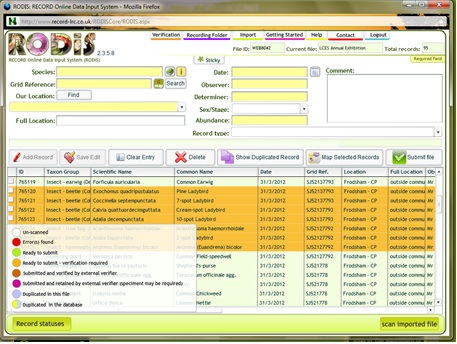Local Environmental Record Centres (LERCs) are familiar to many as the local embodiment of the NBN. Local naturalists and wildlife enthusiasts are often able to contribute to the national natural history record through their local record centre, and are now receiving training in Cheshire, Cumbria and Norfolk thanks to a fund provided by the NBN Trust through its contract with Defra.
-smaller.jpg) RECORD, the LERC for Cheshire, Halton and Warrington and Wirral, has recently been training people in online recording using their web-based system, RODIS (RECORD Online Data Input System). Featuring on the RECORD website, RODIS allows local recorders to enter species records, have them validated and verified and submit them to the RECORD database, which is a significant contributor to the NBN Gateway. Four sessions were held in March and April 2012, attended by fourteen people who came from a variety of backgrounds. In attendance were local BSBI recorders, local ecological consultants, students and other local amateur wildlife recorders. By partnering with the University of Chester, RECORD was able to make use of one of their computer suites and provide a fully interactive session. Paul Hill of Cheshire Mammal Group was able to set up an “ad hoc” version of RODIS for Cheshire mammal recording whilst at the session.
RECORD, the LERC for Cheshire, Halton and Warrington and Wirral, has recently been training people in online recording using their web-based system, RODIS (RECORD Online Data Input System). Featuring on the RECORD website, RODIS allows local recorders to enter species records, have them validated and verified and submit them to the RECORD database, which is a significant contributor to the NBN Gateway. Four sessions were held in March and April 2012, attended by fourteen people who came from a variety of backgrounds. In attendance were local BSBI recorders, local ecological consultants, students and other local amateur wildlife recorders. By partnering with the University of Chester, RECORD was able to make use of one of their computer suites and provide a fully interactive session. Paul Hill of Cheshire Mammal Group was able to set up an “ad hoc” version of RODIS for Cheshire mammal recording whilst at the session.
In Cumbria, Cumbria Biodiversity Data Centre (CBDC, the LERC for Cumbria) held a similar session, where they were able to train eleven people, from varying backgrounds, on how to get to grips with RODIS, which CBDC have recently acquired. Moustafa Eweda, Data Officer at CBDC, is expecting to receive more data thanks to online recording and validation and verification of data should now be easier; “Using this online system not only can encourage people to submit more records but also will enhance the quality of the submitted records. This will make the validation and verification process much easier and managing the receiving records more efficient.”
 In Norfolk, Norfolk Biodiversity Information Service (NBIS) is running training throughout the field season, helping with identification and data collection, as well as online recording. One session will be on invasive species recording, with a focus on identifying species and recording them using NBIS’s implementation of Indicia, the open source toolkit for producing online recording pages. Further sessions will be on validation and verification of large datasets, aimed at county recorders, and a recording workshop for the Green Lanes Survey, an NBIS and Norfolk and Norwich Naturalists Society joint enterprise.
In Norfolk, Norfolk Biodiversity Information Service (NBIS) is running training throughout the field season, helping with identification and data collection, as well as online recording. One session will be on invasive species recording, with a focus on identifying species and recording them using NBIS’s implementation of Indicia, the open source toolkit for producing online recording pages. Further sessions will be on validation and verification of large datasets, aimed at county recorders, and a recording workshop for the Green Lanes Survey, an NBIS and Norfolk and Norwich Naturalists Society joint enterprise.
Financial support for all the work described above was provided by the NBN as part of a Defra-funded project to help Local Record Centres to deliver training and support to data providers.
Written by Tom Hunt, ALERC National Co-ordinator
